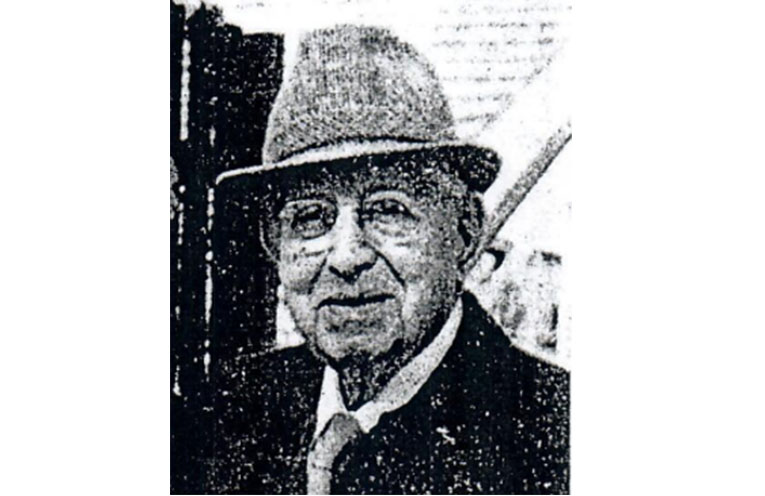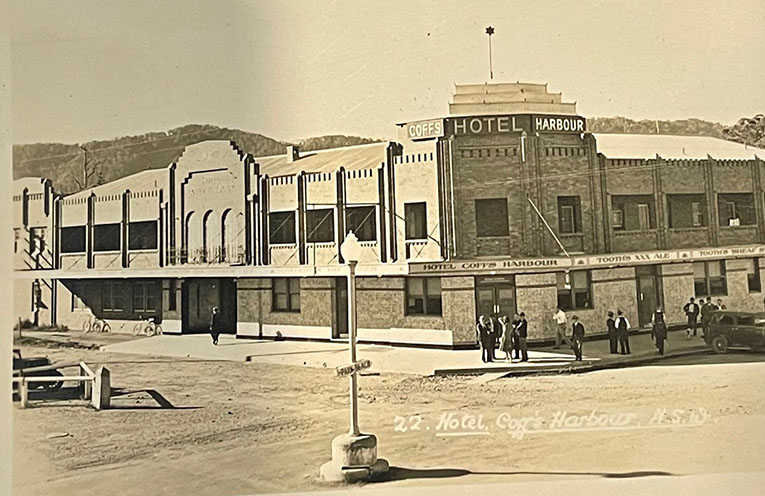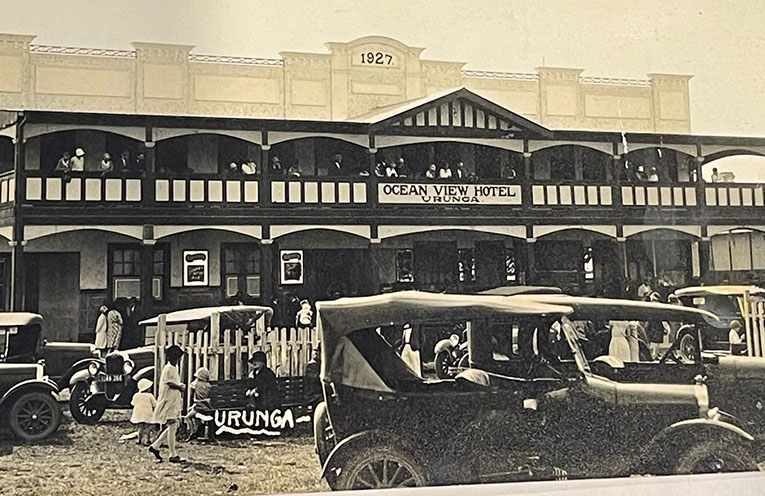
OPENED ON 1 APRIL 1937, the Coffs Hotel this week celebrates a remarkable 85 year history which started in 1908 when a penniless 12-year-old boy from Greece travelled alone to Sydney on a German boat to reunite with his brother.
The frightened boy, who couldn’t speak a word of English, nervously made his way through the crowd at Pyrmont clutching his world of possessions, a battered suitcase and two florins, in search of his elder brother who arrived a few months earlier.
Nick and his older brother Peter grew up in a large family on the Greek island of Kythera and it was through poverty, political unrest and a lack of opportunities they made their separate ways to Australia.
When Nick and Peter reunited in Sydney they looked for employment opportunities and headed to the mining boom town of Cobar where new mines were opening every day.
Nick’s son John Gleeson provided News Of The Area with newspaper clippings which included an interview with his father in the Bellingshire Supplement in the early 1980s to help retell this remarkable story.
After several months in the mining town of Cobar, Nick and Peter Gleeson managed to save a few pounds and Peter decided they should return to Sydney.
Nick worked 104 hours a week at a restaurant in Erskine Street where he received ten shillings per week which included his keep and half a day off each week.
“I had an account in the Government Savings Bank and it became a ritual to head for the bank during my time off the job.
”Nowadays people are astonished when you talk about 104 hours and a bob a week, but I was still only thirteen and I couldn’t imagine a lad of my age earning that much in Greece.
“Besides, I was in a fairly happy position, a woman came in each week to do our washing, we wore waiters’ white shirts of course and I was among people I understood.
“Also I had something that was a bit of a rarity then – three square meals a day, I’d have been lucky to get three a week back at Kythera,” said Nick.
At the tender age of thirteen, Nick recognised that his stumbling English was a handicap so he headed to Tamworth to work in a restaurant and learn English.
“I used to work all day and night but a period was set aside for me to attend a convent school nearby and for something over a year, I learned what ‘hard yakka’ can mean.
“And to this day I can’t decide which was harder – serving in the restaurant or wrestling with English language at school,” said Nick.
By the age of 15 Nick was speaking and writing his new language very well and decided to venture into unknown territory once more – Coffs Harbour.
“I heard about a place where there seemed to be opportunities.
“It was a sleepy little coastal town where ships sometimes called in on their voyages to Sydney and Brisbane.
“There was said to be a lot of promising country being opened up to the west of the village, especially on the plateau above the surrounding mountains.
“The name of the place was Coffs Harbour,” he said.
For the first time in his life, Nick could afford a holiday so he went back to see his brother in Sydney before embarking on the ‘Numinbah’ a well known ship in the coastal trade and sailed to Coffs Harbour.
Nick eventually arrived in Coffs Harbour at 5 o’clock in the morning but due to difficulties with the bar the ship was unable to dock so he arrived on the shores in a basket.
Nick’s first job was with two Greek gentlemen who conducted a mixed business in Moonee Street near the Fitzroy Hotel.
Nick worked industriously and saved enough money to set up his own business.
At the time, the road from Coramba to Dorrigo was being built and word was going around that Dorrigo was an up and coming place so at the age of 17 with a heart full of hope, Nick bought a horse and rode to Dorrigo.
After travelling the world and progressing through New South Wales through ‘hard yakka’, Nick quickly found a shop to lease on the main street of Dorrigo from a local resident named George Ross.
The Gleeson Brothers Oyster Shop in Dorrigo was established.
Nick called for his brother to join him so Peter left his job in Sydney and the brothers reunited in Dorrigo where they formed the Gleeson family business.
“My reunion with Peter was very different from that cold day at Pyrmont five years before, we were now able to look forwards to the future with a lot more confidence than we had then,” said Nick.
The brothers started a business hauling goods from Bellingen to Dorrigo making the frequent strenuous trip up Dorrigo mountain through an ill-defined boulder-strewn track.
“I don’t know who was more tired when we finished those trips, sometimes I’d spell the horse and sometimes he’d spell me.
“On one occasion we nearly came to grief at Gordonville; the river was in flood and as we crossed I noticed that the horse was starting to swim and that he was being swept down-stream.
“It looked like curtains for both of us, but luckily he found a footing on a submerged sand spit and we managed to struggle ashore.
“Another time I had just reached the top of the mountain when a violent storm overtook us.
“I got lost in the cemetery and ran into another chap who was lost too, when we came face to face in the gloom we frightened the living daylights out of each other,” said Nick.
Through ‘hard yakka’ the brothers thrived and extended their business buying a restaurant in Bellingen and ran two other businesses.
In 1918 Nick was naturalised in Bellingen and in 1919 obtained a drivers licence and bought a new car, a rare novelty back then.
“It was a Buick Tourer, I paid 425 pounds for it and used it to convey the goods I’d previously carried on the cart to Dorrigo.
“Then three years later I sold it to George Purves, the Bellingen baker for 425 pounds. The price of cars had gone up in the meantime.
“It was a condition of the contract of sale that I had to drive George to North Beach every Sunday because he hadn’t learnt to drive, it suited me, I caught plenty of jewies and whiting there,” he said.
In the 1920’s the brothers sold their Bellingen and Dorrigo businesses and ventured into the hotel business, purchasing the Urunga Hotel.
“The hotel was a popular holiday rendezvous for tram and train employees from Sydney, very few people could afford to travel then, but those chaps used to get a free train ticket each year and they used to head to Urunga.”
The brothers had acquired holdings of land and bought the licence of the Hotel in Repton which they transferred to establish the Coffs Harbour Hotel, but they had to wait because there was no water supply.
Eventually the new hotel was built and named the Coffs Harbour Hotel.
Nick recalled with pride that he supplied the money to build the original bowling green in Coffs Harbour and was one of the first members of the club.
Nick married in 1933 to an Australian girl of Greek parentage Kalomira Comino, whereas Peter returned to Greece in 1930 to meet his bride.
Nick had three children – a son John, and two Daughters Angela and Helen who went to Urunga Primary School and went on to study at Sydney University.
Nick was noted for his generosity, and a Urunga business man once said, “Whenever there is a worthy cause to be supported, Nick Gleeson is always the first to put his hand in his pocket.”
Peter Glesson passed away in 1956 and Nick Gleeson passed away in 1987, but the ownership of the Hotel has remained in the Gleeson family ever since.
John Gleeson used two words to describe his father’s remarkable story – “hard work”.
“My father arrived in Australia in 1908 with nothing but a hard work ethic and he frequently used the term ‘hard yakka’.
“He had an interesting life which made me understand how lucky we are in Australia.
“He always stressed, if you want to succeed you have to work for it, there is no easy way but your number one priority should be your family,” said John.
By David WIGLEY

